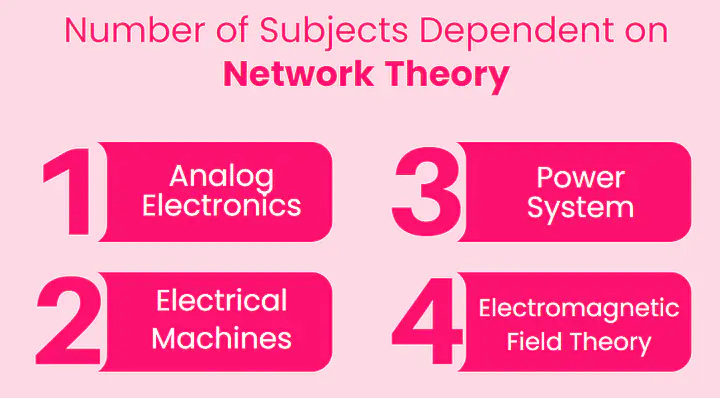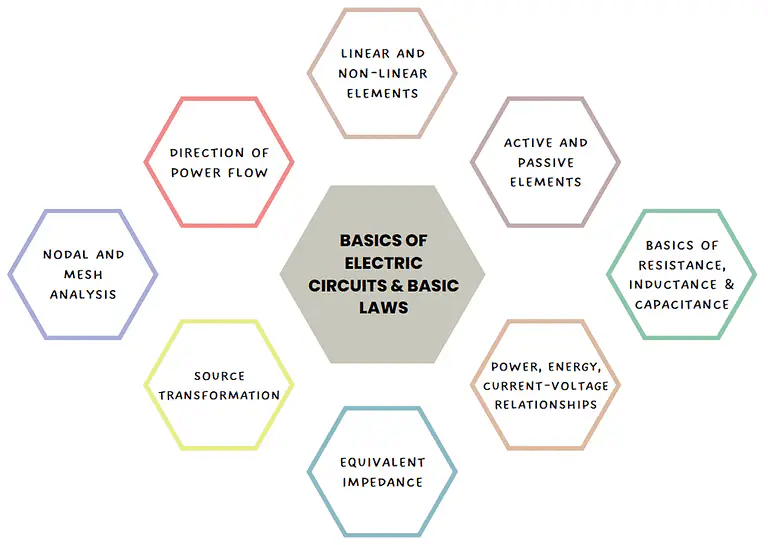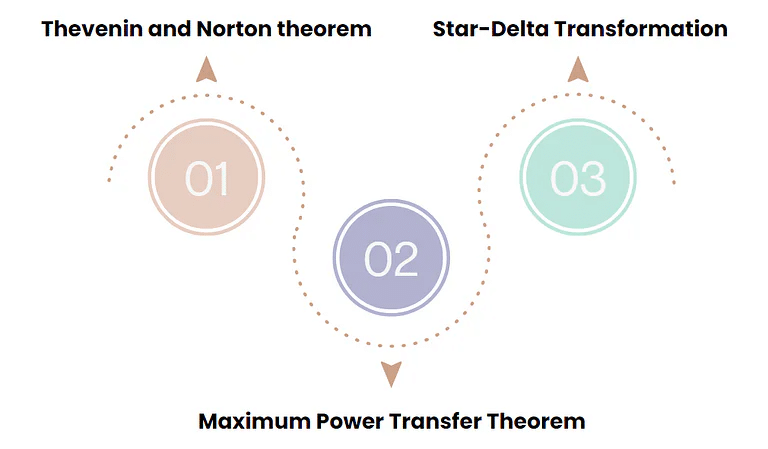Electrical Engineering (EE) Exam > Electrical Engineering (EE) Notes > How to Prepare for GATE Electrical Engineering (EE) > How to Prepare for GATE EE Network Theory (Circuit Theory)?
How to Prepare for GATE EE Network Theory (Circuit Theory)? | How to Prepare for GATE Electrical Engineering (EE) PDF Download
| Table of contents |

|
| Introduction |

|
| Tackling Easy Problems |

|
| What is Common in GATE EE & GATE ECE |

|
| Start your GATE EE Preparation with Network Theory |

|
Introduction
- Network theory is the study of solving the problems of electric circuits or electric networks.
- It is the most important subject for any Electrical Engineering or Electronics & Communication Aspirants.
- At the same time, it’s a prerequisite for other important subjects such as Analog Electronics, Electrical Machines, Power Systems, etc.

Tackling Easy Problems
- The problems are not so tricky in this subject, and it becomes one of the better scoring topics in the GATE examination.
- It’s advisable you should avoid mistakes, learn every topic carefully as it will majorly impact your GATE score.
What is Common in GATE EE & GATE ECE
- Most of the topics in the EC and EE curriculum for the Network Theory is the same except for three topics - Three Phase Circuits, Graph Theory, and Magnetic Circuits. These are additional topics in the EE curriculum.
Start your GATE EE Preparation with Network Theory
You can start your preparation with Network Theory as it will help you further in other subjects.
The objective of this document, which was created by EduRev professionals, is to explain how to study Network Theory efficiently. To that end, they have created a comprehensive study plan for Network theory.
After carefully examining the study habits of GATE toppers, the EduRev experts created the study plan that is provided below.
Week 1
(i) Basics of Electric Circuits
(ii) Basic Laws
 The topics that need to be studied in this chapter would be as follows:
The topics that need to be studied in this chapter would be as follows:
- First, you have to study the nature of circuit elements such as Linear and Non-linear elements, Active and Passive Elements, etc. and the basics of Resistance, Inductance, and Capacitance such as Power, Energy, Current-Voltage relationships, etc.
- Then you learn equivalent impedance and techniques such as Source Transformation etc.
- Attempt basic circuit solving using the techniques such as Nodal and Mesh Analysis as these methods are very powerful and will even help you in other subjects.
- In the end, study the basics of energy and power which is very helpful in other EE core subjects so you need to understand how you can determine the direction of power flow i.e., power being absorbed or delivered.
Week 2
(iii) Network Theorems

- The most important theorems are Thevenin and Norton theorem as sometimes the equivalent circuit can be directly asked, other than that theorems like Superposition, Tellegen’s theorem is not very important.
- Here, Star-Delta Transformation is important as it can be used with other subjects and can be used for the Transient Stability Analysis for Fault away from line ends in Power Systems.
- Maximum Power Transfer Theorem is also important but there is one trick involved there as well that this theorem is only applicable when you need to derive the maximum power delivered to load and the load resistance is variable.
Week 3
(iv) Two Port Networks
- Here the important parameters are Z-parameters, Y-parameters, H-parameters, and Transmission Parameters.
- You need to memorize the conditions for Symmetry and Reciprocity in terms of various parameters.
- Also, one more thing is important here as to what parameters are added or multiplied for different network configurations like Cascaded Connection, Parallel Connection, and others.
- To find these parameters you just need to remember the Network Equations for various parameters and then decide which quantity should be equated to zero to find a particular parameter which avoids the need to memorize the formulas for these parameters.
 |
Download the notes
How to Prepare for GATE EE Network Theory (Circuit Theory)?
|
Download as PDF |
Download as PDF
Week 4
- The transient response for general circuits like RC and RL circuits should be directly remembered in terms of initial and final conditions. It will save you a lot of time and can be used in many places else like Chopper circuits in Power Electronics.
- Apart from this, there is not much but you should always try to solve one or two problems completely by forming the differential equations and solving them so that you can always handle the non-standard cases.
- Also, there are second-order networks such as the RLC network and LC oscillator and in those cases, you need to understand how to write the response based on whether the network is under-damped, critically damped, or over-damped.
- LC oscillator comes in handy when we study Power Electronics.
Week 5
(vi) Sinusoidal Steady State Analysis
(vii) Resonance
- The most important concept under this topic is the concept of Phasors which is important as they encounter Phasors more often in Electrical Machines and Power Systems.
- This is important as it reduces the effort immensely for solving an AC Network and also for this topic, you need to have a command on dealing with complex numbers by hand as complex functionality is not present in Virtual Calculator.
- After that, you also need to study how the Network Theorems change for AC circuits as when there are multiple sources having different frequencies, the Superposition Theorem comes in handy. The maximum power transfer theorem is a bit more complicated as compared to DC circuits as there are different cases based on Load and Source Impedance.
- The concept of Resonance is also very important under this topic and the key to that is just to equate the imaginary part of Impedance and Admittance to zero based on the case under consideration.
- Also, you need to remember basic formulas for Quality factor and bandwidth for Series and Parallel RLC networks.
- Then you also need to have the basic knowledge about drawing the locus diagram of different phasor quantities in an AC network.
- This topic is small but sometimes asked and it is very much similar to Polar Plot in Control Systems so you can easily understand it by relating it to Polar Plot.
Week 6
(viii) Magnetic Coupled Circuits
- This topic though not directly mentioned under the Network Analysis curriculum but it is present under EMT in the GATE EE curriculum.
- The topics that you need to study in this chapter are the basics of MMF, Flux, and Reluctance and these concepts will help you in Electrical machines.
- Other than that Dot Convention is very important for Transformers.
- If you have a grip on these concepts then you can compute Equivalent Inductance in circuits consisting of Magnetically Coupled Coils.
- These topics will help you ace your GATE exam preparation.
Week 7
(ix) Graph Theory
- The questions from this topic in GATE might be rare but still, this topic should be prepared for the sake of completeness.
- In this section, small topics are very much important like the number of trees possible for a given network but concepts like Incidence, Cut-Set, and Tie-Set Matrix are not very much important.
- Still, it's advisable you should once go through them before the BIG exam day.
- Also, you should remember various terminology such as twigs, links, etc.
- This topic is not present in ECE GATE Curriculum.
Week 8
Practice Full Subjects Tests
The document How to Prepare for GATE EE Network Theory (Circuit Theory)? | How to Prepare for GATE Electrical Engineering (EE) is a part of the Electrical Engineering (EE) Course How to Prepare for GATE Electrical Engineering (EE).
All you need of Electrical Engineering (EE) at this link: Electrical Engineering (EE)
FAQs on How to Prepare for GATE EE Network Theory (Circuit Theory)? - How to Prepare for GATE Electrical Engineering (EE)
| 1. How can I start my preparation for GATE EE Network Theory? |  |
| 2. What are some important topics to focus on in GATE EE Network Theory? |  |
Ans. Some important topics to focus on in GATE EE Network Theory are:
1. Network graph: Trees, co-tree, and fundamental cut-set and loop analysis.
2. Network theorems: Thevenin's theorem, Norton's theorem, Superposition theorem, Maximum Power Transfer theorem, and Reciprocity theorem.
3. Network equations: Nodal and mesh analysis, and network functions.
4. Network topology: Concept of graphs, incidence matrix, and Laplace transform.
5. Two-port networks: Impedance and admittance matrices, transmission parameters, hybrid parameters, and T-parameters.
| 3. How can I effectively solve numerical problems in GATE EE Network Theory? |  |
Ans. To effectively solve numerical problems in GATE EE Network Theory, follow these steps:
1. Understand the given problem and identify the type of circuit.
2. Apply the appropriate circuit analysis technique, such as nodal analysis or mesh analysis.
3. Simplify the circuit using network theorems and simplify the equations.
4. Solve the resulting equations to obtain the desired values.
5. Double-check your calculations and ensure they are accurate.
| 4. Are there any recommended resources or books for GATE EE Network Theory preparation? |  |
Ans. Yes, there are several recommended resources and books for GATE EE Network Theory preparation. Some popular ones include:
1. "Network Analysis" by M.E. Van Valkenburg
2. "Circuit Theory: Analysis and Synthesis" by A. Chakrabarti
3. "Engineering Circuit Analysis" by William H. Hayt Jr. and Jack E. Kemmerly
4. "Network Theory: Analysis and Synthesis" by Smarajit Ghosh
5. "Electric Circuits" by James W. Nilsson and Susan A. Riedel
These books cover the fundamental concepts, theories, and problem-solving techniques in network theory.
| 5. How can I improve my conceptual understanding of GATE EE Network Theory? |  |
Ans. To improve your conceptual understanding of GATE EE Network Theory, focus on the following:
1. Regularly revise the fundamental concepts and theories.
2. Solve a variety of practice problems and numerical exercises.
3. Analyze and understand the solutions to different types of circuit problems.
4. Engage in group discussions or join online forums to clarify doubts and discuss concepts with fellow aspirants.
5. Watch online video lectures or tutorials to reinforce your understanding of complex topics.
6. Take mock tests and previous year question papers to assess your knowledge and identify areas for improvement.
Related Searches

















